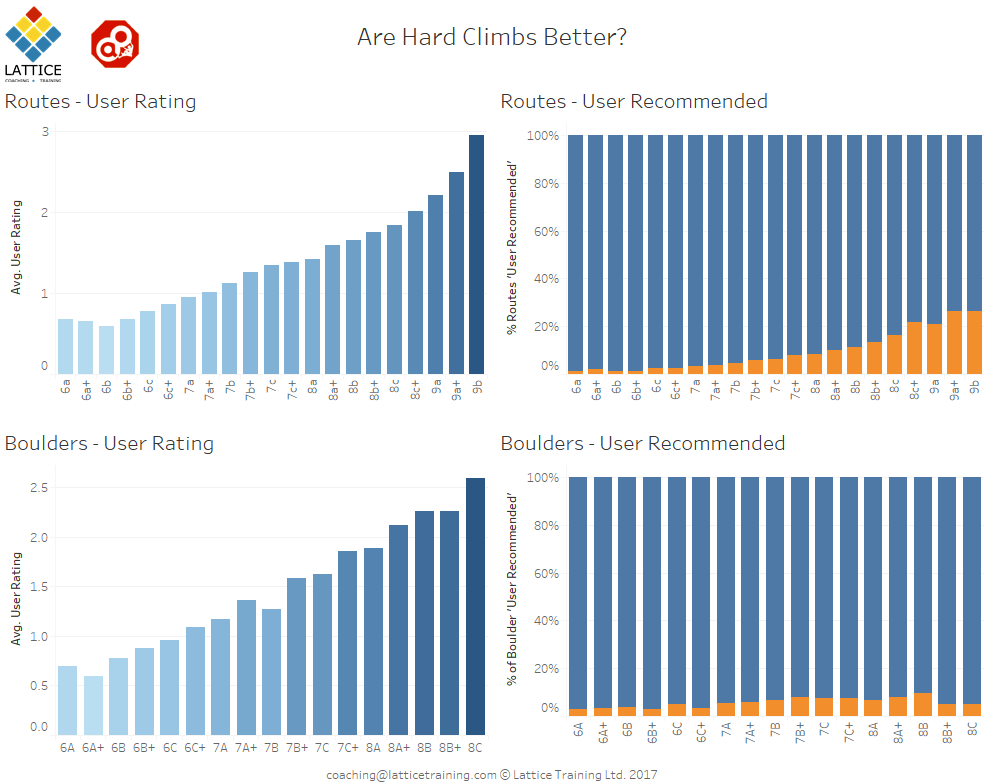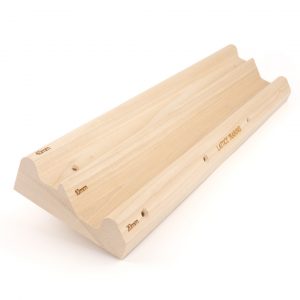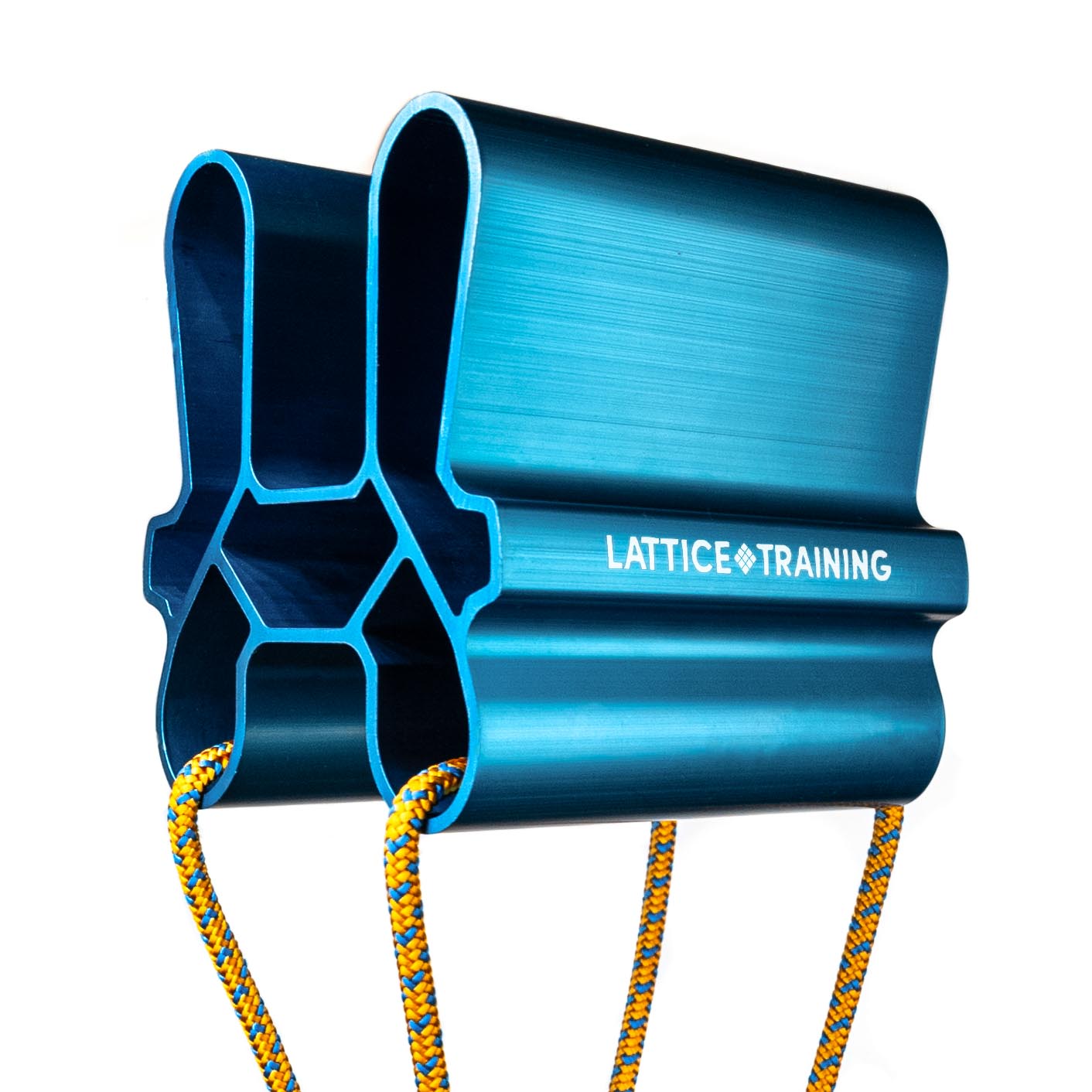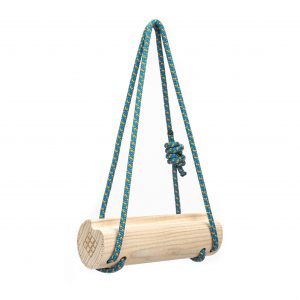Are Hard Climbs Better?
[Update 13/10/2017: user NP pointed out an interesting issue with the below article in the comments. We’ve done a follow up in Are Hard Climbs Better? Part 2]
Have you ever noticed how if you flip open your favourite guidebook all the hardest climbs in the area will tend to get more stars than the easier climbs? On the surface this is quite strange, it seems weird that hard climbs are somehow inherently better than easy climbs.
We were having a look through the 8a.nu top 100 female/route/boulder dataset and noticed this trend once again.

8a.nu provides a couple of mechanisms for users to record how good they thought a given climb was: they can give a star rating from 0 to 3 (similar to what you’d find in most guidebooks) or they can add the climb to their recommended ascents. If we look at the user ratings, we see a very clear trend of users rating their high grade ascents more highly than their lower grade ascents. This is true for both routes and boulders. For the ‘User Recommends’ metric we see a similar trend for routes, though interestingly we don’t see this for boulders.
Why is this? We probably need to think about what it means for a climb to be ‘of high quality’. Thinking about it from a guidebook author’s point of view, they’re trying to recommend routes to climbers so that the climber can have an enjoyable experience. One persons enjoyable experience is a 72-hours-with-no-sleep alpine epic whereas another’s enjoyable experience is a couple of hours’ low grade bouldering after work. These people have different ideas about what a quality climb is, so in catering to a wide audience the guidebook author needs to take an average of how much fun all these people will have on a given climb to try and work out a star rating.
Thinking about the question of quality from the point of view of a single climber is easier. Did you enjoy the climb or not?! This makes the interpretation of the 8a.nu data substantially easier, as we don’t need to worry about any of this ‘average experience’ guidebook related stuff. In other words, we can conclude from the data above that on average the people who use 8a.nu enjoy hard climbing more than easy climbing.
We need to be careful about generalising from the 8a.nu sample as there could be some selection bias at work here. Perhaps people who like logging all their climbs and scoring themselves against others are more competitive and thus enjoy harder climbs?
So to answer our original question…are hard climbs better? Well it depends who you ask! The population of 8a.nu probably enjoys pushing themselves on hard climbs more than average, so of course they’ll say harder climbs are better because that’s what they enjoy!







Ha ha fair question, but no! Merely a user, of both sites, and have always found 8a.nu frustrating in this way (and in many other ways also solved by thecrag.com…). Thanks for the article update, it’s rare to get such a swift & comprehensive response!
As Mike pointed out, the ascents quality data is skewed to higher grades because climbers tend to shop around and only choose good routes to project. One way to correct for this would be to consider route quality, not ascent quality.
Also even for these 100 climbers, at the high grades there is a diminishingly small sample size and therefore worse confidence intervals. A few error bars, or giving the sample size, would illustrate the reduced reliability with increasing grade.
The 8a.nu data is inherently flawed by bad system design, because when entering a send, it defaults to zero stars instead of “no comment”. Many climbers don’t intend to express ANY opinion about the quality of “easy” routes they log, but the 8a.nu system takes this as a deliberate entry of ZERO stars which artificially drags down the average star rating for easier routes. This is a (probably major) contributing factor to the trend your charts show. A far superior route logging system design is thecrag.com by the way.
Good spot there! I hadn’t noticed that the default was a 0 star rating, and as you guessed this does significantly change things. I dug in to it a little in a follow up post http://34.242.140.1/2017/10/13/are-hard-climbs-better-part-2/.
You don’t work for thecrag.com do you?! 😛
Something to think about. If two climbs are equally “fun” (quality of moves, rock, exposure, etc.) then for most people the harder climb will likely be considered more fun by someone as not only was the harder climb just as fun it also added enjoyment from conquering/overcoming a challenge; where-as the easier climb was fun but success in sending it was probably a given. For the very upper end of the climbing grade there is hardly anyone that would consider the send a given so most people rating them will also have that additional satisfaction of overcoming a challenge and accomplishing a goal. So to me harder routes are inherently breed graded for a reason other than if they are actually more fun.
There is also projecting to consider. No one is going to project a shitty route for obvious reasons but you will warm up on a shitty “in-fun” route because your main goal is just to warm up and a need for variety can easily outweigh an “un-fun” route.
So to me harder routes are,on average, more enjoyable because of the experience you get from the route that has nothing to do with the climbing.
I think it’s worth bearing in mind that this dataset is only ascents from climbers in the top 100 female/sport/boulder rankings. With that in mind, I’m not sure I agree with your first point. These climbers are all redpointing well in to the 8th grade, so Id have thought they’d have gotten a similar level of (dis)satisfaction from a 7a vs. a 7a+. Both are going to be equally easy for someone operating in the high 8s.
I agree with your second point though. Having said that, my intuition is that there’s going to be a few factors at play here. For example, I suspect a lot of people wouldn’t log their warm ups, so does that cancel out the “it’s just a rubbish warm up” effect? Maybe people only log the warm ups they think are particularly note-worthy?
I think your last paragraph is spot on! At the end of the day the quality of the route is more about how good of a time you had on it, so it’s not something inherent in the climb itself.